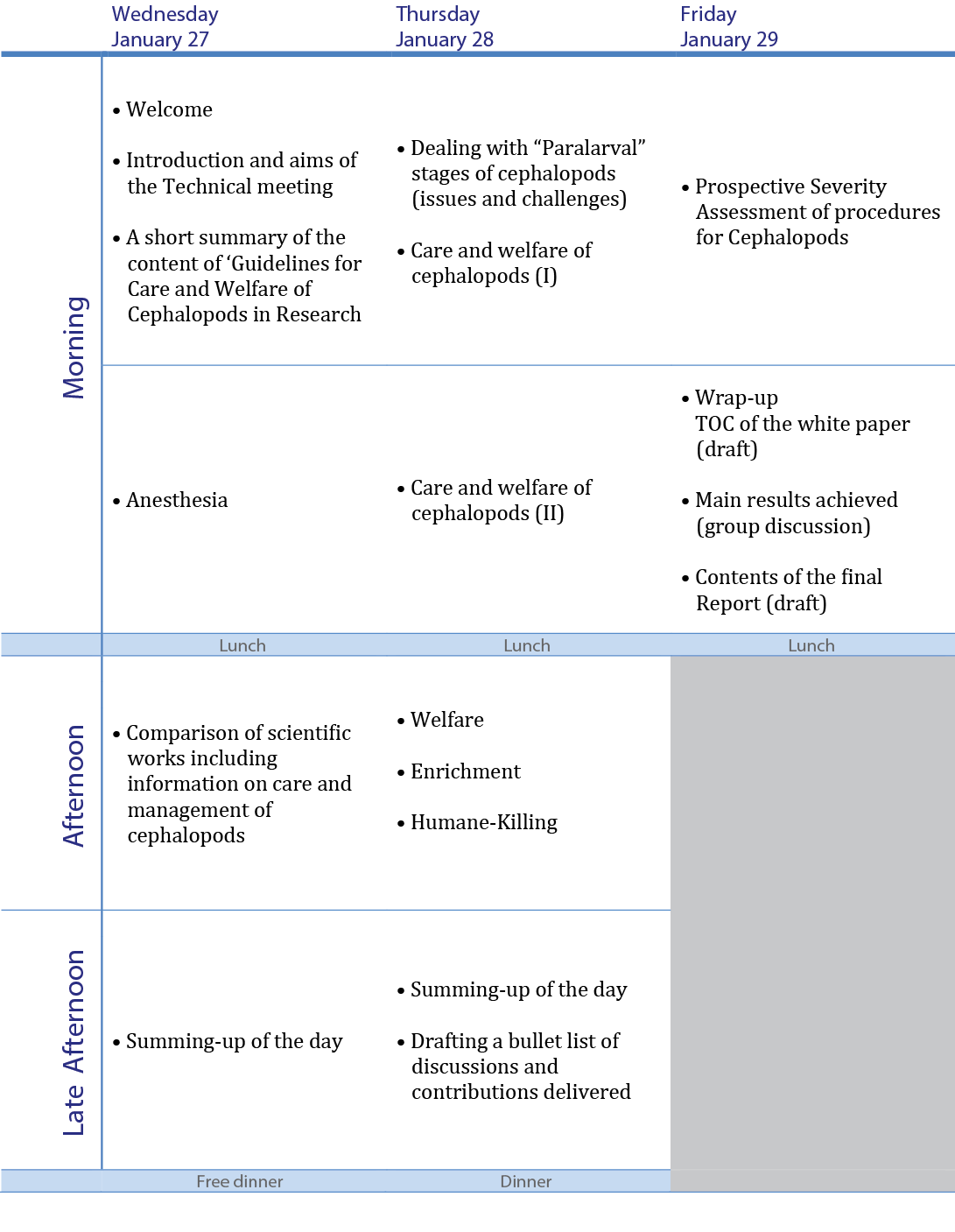CephsInAction for Directive 2010/63/EU
CephsInAction for Directive 2010/63/EU
Freie Universitaet – Berlin – Germany
Rooms 2 and 3 – Zoology Institute, Königin-Luise-Str. 1-3
January 27 – 29, 2016
Following the publication of the ‘Guidelines for the Care and Welfare of Cephalopods in Research’ (Lab. Animals 2015, 49: 1-90), the COST Action FA1301 activated an internal review of the currently available information to develop further consensus with the aim of defining suggested mandated minima for care of cephalopods and welfare of cephalopod species in respect of the principles stated in the Directive 2010/63/EU.
The technical meeting CephsInAction for Directive 2010/63/EU aims to compare the most accurate published works and the available knowledge, best-practice and related information in order to provide a technical summary aimed to represents the mandated minima to be suggested for care and management of cephalopods for scientific research.
CephsInAction for Directive 2010/63/EU meeting marks the continuation of the community effort that the COST Action FA1301 is promoting.
Aims of the meeting are to contribute by an open and in-depth technical discussion to a number of the goals of CephsInAction, such as:
i. Monitoring the application of Guidelines for the Care and Welfare of Cephalopods in Research, the improvement of experimental practices, and the impact of the transposition of Directive 2010/63/EU and MFSD in Member States
ii. Evaluation of the environmental, biological and behavioral needs of different cephalopod species to increase success of caring, maintenance, growth and rearing aimed to reduce stress and increase welfare in research and aquaculture establishments
iii. The contribution to the development and application of a consensus in the Severity Assessment of procedures, in compliance with Directive 2010/63/EU;
iv. The contribution to the standardization of methods for the use of anesthesia in procedures
v. Recommendation on humane-killing methods
The meeting is also aimed to provide suggestions for research priorities including the evaluation of cephalopods well-being and health status, thus providing guidance for researchers, veterinarians and regulators
Directive 2010/63/EU does not provide any kind of information or recommendation for cephalopods, therefore the contributions we are fore-seeing is important considering that it will provide: i. a natural complement to the ‘Guidelines’, ii. an important achievement of the cephalopod community, and of the COST Action FA1301 CephsInAction in possibly informing the countries and regulators, and possibly the European Commission, on the mandated minima, iii. a short version, possible future annex to the Guidelines that maybe endorsed at national level to achieve uniformity among different countries and laboratories.
Agenda

Attending Participants
Members of the FA1301 COST Action and contributors of recent review works will attend to the meeting and will be joined by invited scientists from non-COST countries.
Group discussion will be facilitated to achieve consensus.
A representative acting as Technical Expert for the European Commission will attend to the meeting in Berlin and provide guidance.
The list of CephsInAction for Directive 2010/63/EU contributors will be available soon.
Tangible Outputs
The outcomes of the technical meeting CephsInAction for Directive 2010/63/EU will be published in a report format on this website, within February 27, 2016.
In addition, the COST Action FA1301 will publish, as soon as possible, and as additional deliverable to the FA1301 MoU a White Paper as reporting tool.
This document is also aimed to provide:
i. an additional supplement to the Guidelines for Care and Welfare of Cephalopods in Research;
ii. to facilitate convergence between best-practice and knowledge available in different fields (including aquaculture and biological research);
iii. a document to be submitted to the European Commission for consideration in the sake of the possible update of Annexes of Directive 2010/63/EU, thus representing minimal requirements for cephalopod species, in compliance with guidance included into Annex III (Care and Accommodation) and Annex IV (Humane killing) of the Directive 2010/63/EU for other species.
| M | T | W | T | F | S | S |
|---|---|---|---|---|---|---|
| 1 | 2 | 3 | 4 | 5 | 6 | 7 |
| 8 | 9 | 10 | 11 | 12 | 13 | 14 |
| 15 | 16 | 17 | 18 | 19 | 20 | 21 |
| 22 | 23 | 24 | 25 | 26 | 27 | 28 |
| 29 | 30 | 31 | ||||
This website is supported by COST, European COoperation in Science and Technology


